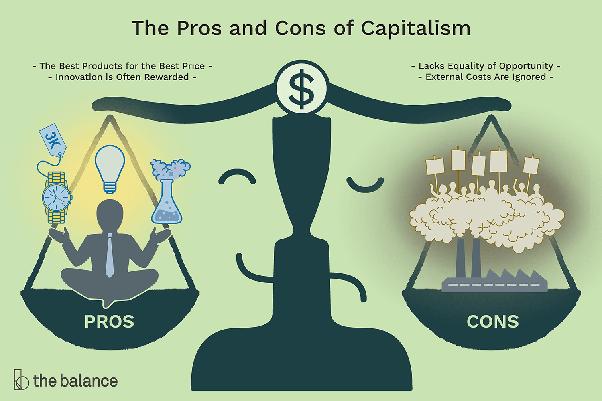Capitalism
Definition
Etymology
Theword"capital"intheLatintermcomesfromthesaleandpossessionofanimals,and"capitalis"comesfromtheoriginalIndo-EuropeanlanguageThe"kaput"-meaning"head","head"isawayofmeasuringwealthinancientEurope:themore"heads"ofcattleapersonhas,thericherthepersonwillbe.Thewords"chattel"(meaningcommodity,animalorslave)and"cattle"(cattle)arealsoderivedfrom"kaput".Inthe12thto13thcenturies,theterm"capital"begantobeusedtodescribecapital,inventoryofgoods,amountofcurrency,orprofitfromcurrency.
DavidRicardousedtheterm"capitalist"manytimesinhis"PrinciplesofPoliticalEconomyandTaxation"in1817.TheEnglishpoetSamuelTaylorColeridgealsomentionedthisterminhisworksin1823.In1867Pierre-JosephPrudhonalsousedtheterm"capitalist"torefertocapital.Everyone.KarlMarxandFriedrichEngelsusedKapitalistinCapitaltodescribeprivateindividualswhoowncapital,butinsteadofdirectlyusingthetermcapitalism,theyusethe“capitalistmodeofproduction”.Thistermappearsmorethan2,600timesinCapital.ButlaterresearchconfirmedthatMarxusedthetermcapitalisminhismanuscripts.
Thesuffix"ism"canbeusedtoindicateacertainhistoricalstate,acertainmovement,acertainideologicalsystem,oracertaincombinationoftheabovemeanings.Thefirsttousetheterm"capitalism"wastheEnglishnovelistWilliamMakepeaceThackeray(WilliamMakepeaceThackeray),whoexpressedtheownershipoflargeamountsofcapitalratherthanasystemofproduction.However,thefirsttousetheterm"capitalism"todescribetheproductionsystemwastheGermaneconomistWienerSombartinhisbook"JewsandModernCapitalism"in1902.MaxWeber,aclosefriendandcolleagueofSombart,alsousedthetermin1904'sProtestantEthicsandtheSpiritofCapitalism.
Differentdefinitions
Therearedifferentopinionsonthedefinitionofcapitalism.
Thisentryusesthedefinitionof"socialsystem"becausethecapitalistmodeofproductionalsodeterminesitspoliticalandculturalsuperstructure.
The"DictionaryoftheCentury"publishedin1909isdefinedas:acountrywithcapitalorproperty;possessionofcapital.Alargeamountofcapitalisconcentratedinthehandsofafewpeople;and,thepowerorinfluenceoveralargeorcombinedcapital.
Westerneconomicsgenerallyregardsitasan"economicsystem."ThedefinitionofcapitalisminMerriam-Webster’sdictionaryis:“Aneconomicsysteminwhichindividualsorcompaniesowncapitalandproperty.Investmentismadebyindividualsratherthancontrolledbythestate.Prices,production,andsalesofproductsaremainlyTheyarealldeterminedbythefreemarket."The1987editionoftheOxfordEnglishDictionaryoftheUnitedKingdomdefinesitas:"Theconditionofpossessionofcapital;theidentityofcapitalists;thesystemthatsupportstheexistenceofcapitalists."
Features
Mainfeatures
Economically,theprivatesectorisdominated,withnogovernmentinterventionorlessgovernmentintervention.Politically,thebourgeoispartyisinpower,orthebourgeoisdemocraticpoliticalsystemisimplemented.
Capitalism(2photos)
Productionisforsaleratherthanforusebytheproducer;thereisamarketforbuyingandsellinglabor,andtheexchangemethodisbasedonacertainperiodoftime.Paymentofmonetarywages(hourlywagesystem)ormonetarywagesforaspecificjob(piece-ratewagesystem);theuseofcurrencyasamediumofexchange,ifnotuniversal,isadominantphenomenon.Becauseoftakingtheformofcurrency,capitalallowsitsownerstohavemaximumschedulingflexibility;capitalistsmaycontroltheproductionprocess,whichmeansthatnotonlydotheyhavecontroloverthehiringanddismissalofworkers,butalsothechoiceoftechnologyandproducts.Thepreparation,laborenvironment,andproductsalesalsohavecontroloverthefinancialdecision-making.Undercapitalistconditions,businessownershavetherighttoraisefundsbyborrowing,issuingstocks,andcollateralizingfactories.Workershavenorighttodecideonthis;Thecontradictionbetweenthesocializationofproductionandtheprivateownershipofcapitalistmeansofproductionconstitutesthebasiccontradictionofcapitalistsociety.Thisbasiccontradictionrunsthroughthedevelopmentofcapitalism.ItiseconomicallymanifestedasThecontradictionbetweentheorganizedproductionofindividualenterprisesandtheanarchyoftheproductionoftheentiresocietyispoliticallymanifestedasthecontradictionbetweenthebourgeoisieandtheproletariat.
Thedevelopmentofcapitalismhasgonethroughtwomajorstages-freecompetitioncapitalismandmonopolycapitalism.
Inlinewiththerulingformofcapitalistproductionrelations,varioussuperstructuresbeforecapitalismwerereplacedbybourgeoissuperstructures,resultinginabourgeoisstatepower,legalsystem,andideologicalsystem.Includingthecapitalistmodeofproductionandthesocialsystemofthesuperstructureadaptedtoit.
Thereasonfortheoppositionbetweenthebourgeoisieandtheproletariat:Thesystemformulatedbythecapitalistsismainlytoprotecttheinterestsofthecapitalists;whilesocialismisruledbytheproletariat,andthesystemformulatedbytheproletariatmainlyrepresentstheproletariat.Interests;theinterestsofthebourgeoisieandtheinterestsoftheproletariatareclearlyopposed.
Quantitativeindicators
Ineconomicresearch,thecontroversialeconomicfreedomindexissometimesused.OneofthetwomostfamousindexesispublishedbytheWallStreetJournalandtheHeritageFoundation,andtheotherispublishedbytheFraserInstituteinCanada.Bothindexesattempttomeasurethedegreeofeconomicfreedomofeachcountry,mainlybasedonregulations,thedegreeofgovernmentintervention,privatepropertyrights,andtradefreedom.Theeconomicfreedomindex"economicfreedom"isdefinedas"thepeople'sproduction,sales,andconsumptionofproductsandservicesarenotsubjecttogovernmentcoercionandrestriction"(thisisalsocalledlaissez-faire).
TheyusedatafromindependentorganizationssuchastheUnitedNationstocalculatethescoresofeachcountryondifferentitems,suchasgovernmentsize,taxrate,securityofpropertyrights,degreeoffreetrade,andmarketcontrolDegree.Manyofthepublishedmaterialsarealsousedbyotherindependentthinktankstostudytherelationshipbetweencapitalismandpoverty.TheFraserInstituteadvocatesthat“countriesthatimplementcapitalismmorethoroughlyhavehigherincomes,thepoorest10%ofthepopulationalsohavehigherincomes,higheraveragelifeexpectancy,higherliteracyrates,andlowerinfantmortality.Rate,moreopportunitiestousewaterresources,andlesscorruption.”Thepoorest10%ofthepopulationbetweencapitalistcountriesandnon-capitalistcountriessharethesametotalincomeratio.Somepeopleemphasizetheimportanceofthecreditsystemincapitalism,especiallythefunctionsplayedbysmallloans.
>Theoreticalbasis
Mosttheoristsknownascapitalismappearedinthe18th,19th,and20thcenturies,suchasDuringtheindustrialrevolutionandEuropeanimperialism(suchasSmithandRicardo),andduringtheGreatDepression(suchasKeynes)andtheColdWar(suchasHayek,Fleming).
Thesetheoristsdefinecapitalismasasysteminwhichcapitalisownedbyprivateindividuals(sometimescalled“capitalists”),andeconomicdecisionsanddecisionsaremadebythemarket—thatis,throughThetradecarriedoutbyagreementbetweenthesellerandthebuyer;itisoperatedbythewisdomofthemarketandentrepreneurialspirit,aswellasthepropertyrightsandcontractsystemprotectedbylaw.Thesetheoristsalsotrytoexplainwhycapitalismcanproducegreatereconomicgrowththanthegovernment-involvedeconomy.(SeeEconomics,PoliticalPhilosophy,Laissez-faire)
TheFinnishParliamentaryMemberAndersChydenius(AndersChydenius)publishedthebook"TheNationalGain"in1765,becomingthefirsttoadvocateAmanoftradeandindustrialfreedomandliberalprinciples,11yearslater,in1776,AdamSmithpublishedthebook"TheWealthofNations".
In1867Pierre-JosephProudhon(Pierre-JosephProudhon)usedtheterm"capitalist"torefertotheownerofcapital.However,thefirsttousetheterm"capitalism"todescribetheproductionsystemwastheGermaneconomistWernerSombartinhis1902book"DieJudenunddasWirtschaftsleben".MaxWeber,aclosefriendandcolleagueofSombart,alsousedthetermin1904'sDieprotestantischeEthikundderGeistdesKapitalismus(DieprotestantischeEthikundderGeistdesKapitalismus).
Theconceptofcapitalismhasalsochangedovertime,anditalsovarieswithpoliticalviewsandanalyticalmethods.TheeconomicliberalismsupportedbyAdamSmithfocusesontheenlightenmentroleplayedbyhumanself-interest(the"invisiblehand")andthespecificroleitplaysinincreasingtheefficiencyofcapitalaccumulation.
Someproponentsofcapitalism(suchasMiltonFleming,AynRand,andAlanGreenspan)emphasizetheroleofthefreemarket.TheybelievethatthefreemarketcanPromotecooperation,innovation,economicgrowth,andfreedombetweenindividuals.Somepeople(suchasthesociologistEmmanuelWallerstein)believethatthehubofcapitalismliesinaneconomicsystemthatallowsproductsandservicestobetradedinthemarket,andthattheproductsofcapitalbelongtonon-stateentitiesandareintheglobalmarket.Operateonscale.
TheeconomistsoftheAustrianSchoolofEconomicsarguethatduetothephenomenonofself-organizationoftheeconomy,theeconomywithoutgovernmentplanningandguidancewillhavebetterefficiency.
Produced
Capitalistrelationsofproductionoriginatedwithinthefeudalsociety.Thedisintegrationoftheeconomicstructureoffeudalsocietyliberatedtheelementsofcapitalism.Inthe14thand15thcenturies,somecitiesalongtheMediterraneancoast(suchasVenice)hadsparselyemergedthebudsofcapitalistproductionrelations,butthecapitalisteraonlybeganinthe16thcentury.
Attheendoffeudalsociety,thedevelopmentofcommodityeconomypromotedthedisintegrationofthenaturaleconomyoffeudalsocietyandcausedthepolarizationofsmallcommodityproducers.Theprimitiveaccumulationofcapitalhasacceleratedthisdifferentiation.Thebasicconditionsfortheproductionofcapitalistmodesofproductionare:ontheonehand,alargenumberofproletarianswhohavelosttheirmeansofproductionandhavetoselltheirlaborareproduced;ontheotherhand,hugeamountsofmoneyandmeansofproductionareconcentratedinafew.Transformedintocapitalinhumanhands.Theso-calledprimitiveaccumulationofcapitalisthehistoricalprocessofforciblyseparatingnaturalpersonsfromtheirmeansofproduction,andthedeprivationofpeasants'landisthebasisoftheentireprocess.Therearetwowaystoproduceit:oneistodifferentiatefromthesmallcommodityeconomy;theotheristotransformfrommerchantsandusurers.Theself-sufficientnaturaleconomywasdestroyed,andalargenumberoffarmersandhandicraftsmenwentbankrupt,thusprovidingcapitalismwithfreelaborandcreatingacommoditymarketforit.Thehistoryofdeprivingfarmersandhandicraftsmenhasdifferentcharacteristicsindifferentcountriesandhasgonethroughdifferentstages.Thetransformationoflaborforceintocommoditiesandthetransformationofmeansofproductionintocapitalmarksthetransitionfromsimplecommodityproductiontocapitalistproduction,aswellasthetransformationoftheformofexploitationoflaborers,thatis,fromfeudalexploitationtocapitalistexploitation.Theprimitiveaccumulationofcapitalalsoincludestheoccupationandplunderofcolonies,aswellasotherviolentmeansofusingstatepower.
Development
Thecapitalistmodeofproductionisincontradictionwiththefeudalsystem'slocalprivileges,hierarchy,andpersonalattachment.Withthedevelopmentofcapitalism,theeconomicandpoliticalpowerofthebourgeoisiehascontinuedtogrow,preparingconditionsforbourgeoisrevolutionsinvariouscountries.Attheendofthe16thcenturyintheNetherlands,theUnitedKingdominthemid-17thcentury,Franceattheendofthe18thcentury,andGermanyandothercountriesinthemid-19thcentury,bourgeoisrevolutionsbrokeoutsuccessively,whichchangedthefeudalsystem,thusclearingthewayforthecapitalistmodeofproductiontoreplacethefeudalmodeofproduction.Uptheroad.
Thecapitalisteconomywasfinallyestablishedaftertheindustrialrevolution,fromthehandicraftindustrytothemachineindustry.Thegreatgeographicaldiscoveriesattheendofthe15thcenturyandthesubsequentcolonialdevelopmentexpandedthesalesmarketmanytimesandacceleratedthetransformationofhandicraftindustryintoworkshophandicraftindustry.Capitalisthandicraftsinworkshops,duetothedivisionoflaborwithintheworkshops,havegreatlyincreasedlaborproductivitythanthesimpleandcooperativehandicraftsintheearlydaysofcapitalism.Bythe18thcentury,inadvancedcapitalistcountriessuchastheUnitedKingdom,therapidexpansionofthedomesticmarketandtheworldmarketincreasinglycontradictedthenarrowtechnologicalfoundationofthehandicraftindustry.Inordertoobtainmoreprofitsinthecompetition,capitalistsrequirefurtherimprovementsinproductiontechnology.Inthiscase,theIndustrialRevolutionoccurred.ThemachineindustrybornintheIndustrialRevolutionmarkedtheestablishmentofthematerialandtechnologicalfoundationofcapitalistproduction.Thetwoantagonisticclassesofthebourgeoisieandtheproletariathavebecomethebasicclassstructureofcapitalistsociety.Thecontinuousadvancementofscienceandtechnologyanditsapplicationinproductionhavepromotedtherapiddevelopmentofproductiveforces,expandedcapitalistproductionrelationstoallbranchesofproduction,andatthesametimefurtherdevelopedtheconfrontationbetweentheproletariatandthebourgeoisie.Theemergenceanddevelopmentofcapitalismhavecommonlawsineachcountryandbringsimilarconsequences,buteachcountryhasitsowncharacteristicsduetodifferentspecifichistoricalconditions.
Thecontradictionbetweensocializedproductionandcapitalistownershipisalsomanifestedintheoppositionbetweentheorganizationalproductionofindividualenterprisesandtheanarchyofsocialproductionasawhole.Simplecommodityproductionalreadycontainsthegerminationofanarchyinsocialproduction,andthecapitalistmodeofproductionhaspushedthisanarchytotheextreme.Theformationoflarge-scaleindustryandtheworldmarketmadethestrugglebetweencapitalistsuniversalandunprecedentedlyintense.Inordertopossessmoresurplusvalue,capitalistsarealsounderthecontrolofthelawofcompetition,makingeveryefforttoapplytheresultsofscienceandtechnology,constantlyimprovingmachines,andstrengtheningtheorganizationofsocialproductionintheirownenterprises.Asaresult,theycontinuetointensifytheentiresocialproduction.Anarchy.Thehugeexpansionofcapitalistlarge-scaleindustrieshasencounteredrelativelynarrowmarketrestrictionscausedbycapitalistpossession,andtheobjectiveproportionnecessaryforsocializedproductionhasencounteredthedestructionoftheanarchyoftheentiresocialproduction,andconflictshavebecomeinevitable.Since1825,theperiodicoutbreakofcapitalisteconomiccrisesisaprominentmanifestationofsuchconflicts.Inthecrisis,allinstitutionsofthecapitalistmodeofproductionfailedunderthepressureoftheproductiveforcescreatedbythemselves.Thecyclicaleconomiccrisisshowsthatsocialproductivityrequiresitsincreasingpowertogetridofitsattributesascapital,andrequirestherecognitionofitsnatureassocialproductivityinfact.Thisresistanceoftheproductiveforcesforcedthecapitalistclasstopartiallyrecognizethesocialnatureofproductiveforceswithinthelimitsofpossiblecapitalrelations.Joint-stockcompanies,monopolyorganizations,andstateownershipresultingfromtheconcentrationofcapitalaremanifestationsofthistrend.Attheendofthe19thcenturyandthebeginningofthe20thcentury,capitalismtransitionedfromthestageoffreecompetitiontoitshigheststage,thestageofmonopolycapitalism.
Thebipolarworldtheoryreviewstheprocessofexternalpressureandthetransformationoftheinternalsocialformofcapitalisminstages,anddividescapitalismintothelandoccupationcapitalistcolonialsystem,thelandtaxcapitalistcolonialsystemandtherawmaterialmarketcapital.Thethreestagesofdevelopmentofthesocialistcolonialsystemcorrespondtothecolonizationofthepublicproductdomain,thecolonizationofthenaturalmonopolydomain,andthecolonizationofthecompetitivedomain.TheriseofBritaintothemiddleofthe19thcenturywasthestageoflandoccupationandcolonization.Thesocialformofthecolonialsystemwassimilartotheslaveryforlandoccupationintheprimitivesocietyandslavesociety;themiddleofthe19thcenturytotheendofWorldWarIIwasthestageoflandtaxcolonization.Themiddleofthecenturytotheendofthe19thcenturywasthefirstlinkoflandtaxcolonization,andtheendofthe19thcenturytotheendofWorldWarIIwasthesecondlinkoflandtaxcolonization.Thesocialformofthecolonialsystemwassimilartothatofthefeudalsocietyinordertoobtainlandbasedonacertainamountofland.Serfdomforthepurposeoftributetaxespaidbythesurvivingpeople;afterWorldWarIItothefirsthalfofthe21stcentury,itwasthestageofcolonizationoftherawmaterialmarket.AfterWorldWarIItothe1970s,itwasthefirststageofthecolonialstageoftherawmaterialmarket.Fromthe1970stothe21stcenturyThefirsthalfofthecenturywasthesecondstageofthecolonialphaseoftherawmaterialmarket.Thesocialformofthecolonialsystemwasaneconomiccolonialformaimedatobtainingrawmaterialsandmarketsbasedontheinternationalunequaldivisionoflabor.
Ideology
Thepoliticalideologiesthatagreewithcapitalismincludethefollowing:
Liberalismisconsistentwithclassicalliberalism,emphasizingThecapitalistmarketeconomyminimizesstateintervention.Libertariansofpettygovernmentbelievethatthesoleroleofgovernmentineconomicactivitiesistoprotecttherightsofparticipantsandpreventviolence,theft,anddestructionsuchaspollution.Becauseofthewidespreaduseofthisterm,notevery"liberal"politicalpartysupportslaissez-fairecapitalism.However,mostliberalpartiesinthe20thcenturyhavemaintainedcapitalismastheirmaingoalandfreetradeastheirmaineconomicplan.
Conservatismvariesaccordingtothedifferentcircumstancesofeachcountry.InWesterncountries,conservatismusuallyagreestomaintainthecurrentcapitalistsystem.Butmanypeoplewhocallthemselvesconservatismpoliticallyarecalledmercantilismeconomically.
Objectivism,aphilosophicaltheoryadvocatedbyAnnRand,arguesthatintermsofpersonalmorality,capitalismistheonlymoraleconomicsystem,becauseifthereisnoinalienable,rationalfreeman,Capitalismcannotexist.
Someideologiesbelievethatcapitalismisactuallyamixedeconomicform,includingcapitalismandstate-ownedfactors.
Merchantismfavorstheestablishmentofanalmostcompletelyfreemarketinthecountry,butsuggeststhatthestatecontinuetointervenetoprotectdomesticcommerceandindustryagainstforeigncompetition.
Capitalism(2photos)
Socialdemocracyandsocialliberalismsupportawiderangeofgovernmentregulationsandpartialgovernmentintervention.Oneconomicissues,socialdemocratsaresomewherebetweensocialismandclassicalliberals.Theybelievethatthegovernmentneedstoregulateemployment,tradeandlabor,andsometimesagreetonationalizecertainindustries.(SeeWelfareState,PoliticalLiberalism.)Reproduction
Proponentsandcriticsagreethatcapitalismhasthefollowingcharacteristics:privatesector,privateownership,freeenterprise,profit,wealthinequalityDistribution,competition,self-organization,theexistenceofmarkets(includinglabormarkets),andthepursuitofprivateinterests.

Asforthemassivegovernmentinterventionintheeconomy—includingthestate-controlledownershipofproductiontools—aneconomicsystemthatmixessomefreemarketcharacteristicsisusuallycalledamixedeconomy,notcapitalism[3].Ifthedegreeofgovernmentinterventionismuchhigherthantheprivatedecision-makingpart,thenthiskindofeconomyiscalledcentralization.Somepeople,suchasMiltonFleming,opposeanygovernmentinterventionintheeconomy.Accordingtosomedefinitions,alldevelopedcountriesbelongtoacapitalistsystem,oramixedeconomicsystembasedoncapitalism.Somepeoplethinkthatthewholeworldhasbeenintegratedintoaglobalizedcapitalistsystem,andeventhosecountriesthatstillrejectcapitalismareoperatinginaglobalcapitalisteconomy.
Privateownership
Thenecessaryfeatureofcapitalismistoestablishandprotectprivateproperty,especiallytheprivateownershipofthemeansofproduction.Privatepropertyrightsexistedintheearlylegalsystem,suchasancientRome,butitwasmoredifficulttoprotecttheserights,becausetherewasnopoliceinRomeatthattime.Romeandsomeearlysystemsoftenforcedtheweaktopaytopowerfulasylumsornoblesinexchangeforprotection.
Proponentsarguethatasolidpropertyandlegalsystemenablecapitalismtopromote:
Maximumindependence;
Clearerandmorecertainownership;
Unifyandintegratenationalpropertyregulationsandpropertyinformation;
Improvetrustbypunishingfraudulentactsintrade;
Withmoreformalandcomplexwrittenownershipcontracts,itwillbeeasiertosharetheriskandthecompany’sOwnership;
Withmoreloanguaranteeprojects,newinvestmentplanswillmakeiteasiertoborrowfunds;
MoreItiseasytoobtainmorecrediblecredithistoryandpropertyvalueinformation;
Strengthenthesubstitution,standardization,andportabilityofthepropertyownershipcontractdocuments,andprovideanationalAsexualmarketstructurepavesthewayandmakesiteasierforindividualsandcorporateentitiestotransferproperty.Andallofthesecanpromoteeconomicgrowth.
Comparedwithsocialism,capitalisminsistsonthepersonalownershipofprivateproperty,especiallytheprivateownershipofproductiontools.Proponentsofcapitalismoftenemphasizethattheproductivityoftheeconomycanbemaximizedwhenthetoolsofproductionarenotcontrolledbythegovernment.LudwigvonMisesarguedthat"inhistory,thedegreeofprivatizationofproductiontoolsisconsistentwiththeevolutionofhumanbeingsfromanimalconditionstothedevelopmentofmoderncivilization."Inmoderntimes,moreorlesspartoftheproductiontoolsineverycountryareownedbythegovernment,butonlyaneconomicsystemwheremostoftheownershipisprivatelyownedcanitberegardedascapitalism.
PrivateEnterprise
Inacapitalisteconomy,mostoftheproductioncapacityisownedbycompanieswhosegoalistopursueprofit.Thisincludesorganizationsthatexistedintheearlyeconomicsystemsuchassoleproprietorshipsandpartnerships.Non-interestorganizationsinthecapitalistsystemincludecooperatives,mutualdepositcooperatives,andcommunes.
Themoreuniqueorganizationofthecapitalistsystemisalegalperson,whichcanbeusedforprofitandnon-profitpurposes.Thiskindofentitycanbearlegalresponsibilitylikenaturalpersonsinlaw,whichalsocreatesuniqueadvantagesforthecompany'sshareholders,sothatshareholdersonlyhavetobearlimitedliability.
Specificformsoflegalpersonsareownedbyshareholders,andshareholdersbuyandselltheirstocksinthemarket.Stocksalsoconvertcompanyownershipintotradablecommodities—therightofownershipisdividedintounitsofstocks,makingthemeasiertobuyandsell.SuchstocktradefirstappearedinEuropeinthe17thcentury,andhasgraduallyexpandedanddevelopedsincethen.Whentheownershipofacompanyisdividedamongmanyshareholders,shareholderscanusuallyvotetoexercisetheirpowerwithinthecompanybasedonthesharestheyhold.
Onabroaderlevel,thecontrolofproductioncapacitybelongstothecompany’sshareholders.Withinthelimitsofthelawandthefinancialcapabilitiesofthecompany,eachcompany’sshareholderscandecidehowtousetheproductioncapacity.Inlargercompanies,thecompany’spowerstructureusuallyhasahierarchyormanagementbureaucracy.
Itisimportantthattheshareholdersofthecompanycanobtaintheprofitsorincomegeneratedbythecompany,sometimesthroughthesharedividendsystem,andsometimesthroughthesaleoftheirassetsatahigherprice.Stocksheld.Theycanalsoreinvesttheseprofitstofurtherexpandthecompany'sprofitsandvalue.Theycanalsosellthecompany,sellallequipment,land,andotherassets,andsharetheproceedsfromthesale.Theownershipofthesoldproductioncapacityisusuallythemaximumpriceorthepriceofthenetpresentvaluemethod,basedontheprofitthatthecompanycangenerateinthefuture.Therefore,theprofitstimuluswillpromptthecompany'sshareholderstoexercisetheirpowertopromotethecompany'sproductioncapacity.Differentshareholdersalsohavedifferentdegreesofthisstimulus-somewillselltheratiotheyhold,andsomewilltrytoincreasethevaluetheyhold.Inanycase,thiskindofprofitstimulusalwaysexists,andmanypeoplealsoregarditasthemainfactorfortheprosperityandgrowthofthecapitalisteconomy.Atthesametime,criticsofcapitalismbelievethatthiskindofprofittocorporateshareholdersistoogreatandallowsshareholderstolegitimatelyobtaintheincomeoflaborproduction.Somepeoplebelievethatthiskindofprofitstimuluscanonlyencourageshareholderstocreateprofits—notnecessarilyWillhaveapositiveimpactonsociety.Somepeoplepointedoutthatinordertomakeaprofit,shareholdersmustmeettheneedsofotherstomakethemwillingtopay.Moreover,althoughnon-profitorganizationsandcommunescanalsolegallyproduceinthecapitalistsystem,peopleusuallytendtobuyproductsandservicesproducedbyprofit-seekingcompanies.
Whenacompanyisfounded,theoriginalownerusuallyprovidessomemoney(capital)tobuyorborrowsomeproductiontools.Forexample,thecompanywillfirstbuyorborrowapieceoflandorahouse,buymachineryandhirelabor(labor),orthecapitalistwillprovidelaboronitsown.Theproductsproducedbylaborbecomethepropertyofthecapitalist(heretheterm"capitalist"referstothepersonwhoownscapital,notthepersonwhosupportscapitalism)andthelaborsellstheproductforthecapitalist,orthecapitalistsellsithimself,andsellstheproceeds.Thecapitalalsobelongstothecapitalists.Capitalistspaylaborandothercoststolaborers,andkeeptheremainingfundsasprofits.Theseprofitscanbeusedinmanyways.Capitalistscanconsumethem,orinvestthemfurtherintheresearchanddevelopmentofnewproductsornewtechnologies,orexpandtheirbusinessterritoryinordertopursuemoreprofits.Ifmorefundsareneededtoexpandtheirbusiness,capitalistswillborrowfundsfromothersandrepaytheprincipalandinterestwithcreditguarantees.
PrivateProfit
AynRand’sobjectivistphilosophybelievesthatthemoralgoalinaperson’slifeistopursuepersonalinterests.
Personalpursuitofself-interestisanindispensableelementofcapitalism.Insuchaneconomicsystem,"ownersoflandandcapital,aswellasthelaborerstheyemploy,canfreelyusetheirresourcesandlaborforproductioninpursuitofmaximumprofit."ManytheoristssuchasAdamSiMiheAynRandbelievesthattheindividual'spursuitofself-interestcanmaketheentiresocietyricher.AdamSmithiswidelyregardedasthefatherofcapitalism.Hebelievesthatself-interestedbehaviorismuchmoreefficientthanaltruismthatclaimstoservethe"publicinterest":
"Bypursuinghispersonalinterests,Onepersonwillbeabletopromotethissocietymoreeffectively.Ihaveneverseenhowmanygoodthingsareachievedbythosewhointerveneintradeforthe"publicinterest".(TheWealthofNations)"
·Randisperhapsthemostfranklysupporterofthepursuitofpersonalinterestsincapitalism.ShewroteinCapitalism:TheUnknownIdeal:
"America’swealthisnotmadebythosewhosacrificeforthepublicinterest.Itiscreatedbythosetalentedandfreepeoplewhoareproductiveandproductiveinpursuitoftheirowninterestsandprivatewealth."
TheNobelPrize-winningeconomistMiltonFlemingalsosupportedcapitalism.Theimportanceofpursuingpersonalinterestshere.Hearguedthatthecompanydoesnothavetheso-calledsocialresponsibility,andtheonlyresponsibilityistoincreaseprofitsforshareholders,aslongasitdoesnotusefraudintheprocess.Headvocatedthatwhilethecompanyispursuingitsprofits,aslongasitdoesnotusefraudanddeception,itcanbringbenefitstothesociety.Flemingdoesnotadvocatethatthecompanyshouldnotassistthesocialcommunity,butratherthataslongasthecompanyinvestsinalong-termbusiness,theywill"contributeresourcestothefacilitiesofthesocialcommunity..."inorderto"enhancegoodwill."Itsprofit.Otherproponentsofcapitalismareopposedtofocusingonself-interest.Forexample,JohnMackey,CEOofWholeFoodsMarketintheUnitedStates,saidinanarticleinReasonmagazinethatservingcustomersandsocietycomesfrom"love"ratherthanself-interest.(Rethinkingthesocialresponsibilityofbusiness,ReasonMagazine,October2005).
Achievingself-interestthroughthepursuitofprofitisanecessaryfeatureofcapitalism.Profitsareobtainedbysellingproductshigherthantheirproductioncosts.Somepeoplethinkthatthepursuitofprofitistheessenceofcapitalism.SociologistandeconomistMaxWeberarguedthat“capitalismisthesameasthepursuitofprofit,carriedoutbydeliberateandrationalcapitalists.”However,thatisnotauniquefeatureofcapitalism.Thesocietyofancienthunter-gatherersTherearealsobenefitsofexchangeandtrade.Incapitalism,profitisanecessaryconditionforeconomicgrowth,andtheprofitpartofthegrowthisinvestedagaininsteadofbeingconsumed.
Freemarket
Capitalism(2photos)
Theconceptof"freemarket"liesinalltheeconomyformoney,products,andservicesDecisionsarebasedonvoluntariness,freefromcoercionandfraud,whichisseenasanecessaryfeatureofcapitalism.Someothereconomicsystemspreventindividualsfromowningproductiontools(includingprofits)orforcethemtobeshared.Atthesametime,someeconomicdecisionsarealsoaffectedbycoercion,whichcannotberegardedasafreemarket.Inanidealfreemarketsystem,alleconomicdecisionscannotbeforciblyinfluenced.Instead,theyaredeterminedbymutualtrade,negotiation,cooperation,andcompetitionamongindividuals.Inafreemarket,thegovernmentmayplayaprotectiveroletopreventmarketparticipantsfromusingcoerciveforces,butwillnotactivelyintervene;thissituationiscalledlaissez-faire.However,somepeoplearguethatcapitalismcancoexistwithauthoritariangovernments,orthatafreemarketcanexistwithoutcapitalism(seesocialistmarketeconomy).Alegalsystemwillrecognizeandprotectpropertyrightsandprovidepropertyownerswiththerighttofreelyselltheirproperty;ifnoonewantstobuyit,theyalsohavetherighttocontinuetoownit.Accordingtothestandardtheoryofcapitalism,asAdamSmitharguedinTheWealthofNations,whenindividualstrade,theyusuallypaymoreattentiontothevalueoftheproductthanthepricetheypayforit.Iftheproductdoesnothavethatvalue,thentheywillnottradeandkeepthingsthattheyassessashighervalue.Thisconceptalsoshowsthatinthetrade,bothpartieshaveassessedthattheywillprofitfromthis.
Inthefreemarket,thepricesofproductsandservicesaredeterminedbypriceagreementsbetweenbuyersandsellers,ratherthanspecifiedbythegovernment.Thispriceisthepriceatwhichbuyersarewillingtopayforthepurchaseofgoodsandthepriceatwhichsellersarewillingtoselltheirgoods.Itisdirectlydeterminedbysupplyanddemand(andtheamountoftrade).Inanabstractconcept,thepriceisdeterminedbythebalancepointofthearcofsupplyanddemand,whichrepresentsthepriceatwhichbuyerswillbewillingtobuy(andsellersarewillingtosell)aspecificquantityofproducts.Thepriceattheequilibriumpointwillleadtoexcessivesupply,andthepriceattheequilibriumpointwillleadtoanincreaseindemand.Whenthepricethatthebuyeriswillingtopayisthesameasthepricethattheselleriswillingtosell,thetradeproceedsandthepriceisdeterminedaccordingly.
However,noteveryonebelievesthatafreemarketisagoodthing.Thereasonthatisoftenusedtojustifygovernmentinterventioninthemarketistheso-called"marketfailure."Marketfailurereferstosituationsinwhichthemarketcannoteffectivelyprovideorallocateresourcesandservices(forexample,whenthemarketdoesnotdistributematerialsaccordingtocertainpeople'sidealconditions,themarketisoftenaccusedofunderminingmoralityorsocialequity).Somepeoplebelievethatifthefreemarketlacks"perfectintelligence"and"perfectcompetition,"thenthegovernmentshouldinterveneinthis(seeperfectcompetition).Commonlycitedmarketfailurephenomenaalsoincludemonopoly,monopolyofmarketinformationsources(suchasinsidertrading),orpricefraud.Wagesdeterminedthroughfreemarketmechanismsareoftencriticizedforcausingimbalancesinincomedistribution.Anothercriticismofthefreemarketistheissueofexternalities.Externalitiescancausethebehaviorofonesideofthemarkettonegativelyorpositivelyaffectotherswithoutbeingnoticed.Themostfrequentlycitedexampleofexternalityispollution.Onthewhole,thefreemarket’sperformanceindistributingmaterialsinareassuchashealthcare,unemployment,wealthinequality,andeducationisoftencriticizedasamarketfailure.Atthesametime,manygovernmentsthatareregardedascapitalistsystemsalsoimposepricecontrolsinthemarket,thusinterferingwiththemechanismsofthefreemarket.Thisusuallyoccursintimesofeconomiccrisis,orinsomeareasofproductsandservicesthatareconsideredtobestrategicallyimportant-forexample,thepowerindustryisheavilyregulatedbythegovernmentinmanycountries.Manywell-knowneconomistshavealsoanalyzedmarketfailuresandarguedthatthegovernmentshouldindeedundertaketheworkofbalancingthesemarketfailures,suchasthroughmarketcontrolandsubsidyprograms.
However,othereconomists,suchasNobelLaureateMiltonFletcherandeconomistsoftheAustrianSchoolofEconomics,stronglyopposegovernmentinterventioninthefreemarket.Theyadvocatedthatthegovernment'sroleintheeconomyshouldberestrictedandthat"marketfailure"shouldnotbeusedasanexcusetointerferewitheconomicfreedom.Theybelievethatmarketfailureisnothingmorethanawrongconcept,whichisusedbymanytojustifythepoliticalbehaviorofthegovernmenttoimposecompulsiveintervention—forexample,thegoalofegalitarianism.Theseeconomistsbelievethatthegovernment'sinterventionwillnotonlysolvetheproblem,butwillcausemoretroubles,andevenresultincompletelyoppositeresultsfromtheoriginalgoaloftheseinterventions.Theselaissez-faireeconomistsarenotopposedtomonopoliesunlesstheyareachievedthroughcompulsorymeanstoavoidcompetition(seeforcedmonopoly).Theyalsopointoutthathistoricalmonopoliesareoftencausedbygovernmentintervention.Notbecauseoflackofintervention.Theyarguethattheminimumwagelawwillonlycauseunnecessaryunemployment,whilethelawthatbansinsidertradingwillreducethetransparencyandefficiencyofthemarket,andthepricecontrolimposedbythegovernmentwillcauseashortageofproductsandservices.Theseeconomistsareusuallybasedonpracticaltheory,buttherearealsomanypeoplewhosupportcapitalismfromamoralstandpoint.Forexample,AynRandsaidthatcapitalismistheonlyeconomicsystemwithmorallegitimacy.
Althoughtheyareusuallyheavilyregulated,financialmarketscanprovidelarge-scale,standardized,andsimplertradedebt,internationalexchangerates,andownershipofcompanies.Therewillbesimilarchangesintheproductionofagriculture,mining,andenergy.
Marketshavealwaysexistedinhumanhistory.Duringthehunter-gatheringperiod,peopleusuallybarterfortheirgoods.Theadventofcurrencymadeexchangeseasier,andalsoallowedthemedievalcommodityfairstoflourish.However,eachsociety(differenttimeandplace)hasitsownviewsontheappropriatenessofproducttrade,andthereforesometimesrestrictsproductionandspecificproducttransactions:ifitisnotbecauseofsuchrestrictionstoachieveothergoals-forexampleStabilizingthepositionoflocalnobles/samurais/chiefsisbecausetheconceptthatcertainproductscanbetradediswrong.Thesealsohindertherealfreemarket.
Eveninthemoderneconomy,thegovernmentdoesnotallowthemarkettooperatefreelyinmanyareas;however,comparedwiththeexampleoftheprivilegesgrantedtotradeassociationsintheMiddleAges,therestrictionsonpriceshavebeenquiteloose.Mosteconomieshaveamixtureoffreemarketandnon-marketsystems.Somepeoplebelievethatcapitalismisnotnecessarilythesameasafreemarket.Theyarguethatcertainelementsofthecapitalisteconomyorpropertyrightswillhinderfreedomintrade.Otherscompletelyrejecttheconceptof"freemarket"andarguethatfreemarketisExploitative,ornonexistent.Forexample,somepeoplebelievethatwagesdeterminedthroughthefreemarketratherthanthegovernmentareexploitative,claimingthattheydepriveworkersofalltheirrightstoproductsandcanonlyacceptlowwagestoearnfoodandclothing.However,economistspointoutthatwagereductionislikedeflationinthemarket:whenthepriceoflabordrops,itsimplymeansthatthedemandforthiskindoflaborinthemarkethasdecreased,orthatitisthesupplyofthiskindoflabor.Toomuch,soitcausedtheaveragepricetofall.
Economicgrowth
Oneofthemaingoalsofasocialsystemwithtradeandpropertyasthecoreroleistopromotethegrowthofcapital.ThestandardmethodofmeasuringgrowthisthegrossdomesticproductcalledGDP,thecapacityutilizationrate(Capacityutilization),andthestandardofliving.
InAdamSmith’sproposition,theabilityofacapitalisteconomytomaintainandimproveitsstoredcapitalisthefocusofthefreemarketinsettingproduction,prices,andresourceallocation.Itisgenerallybelievedthatbeforetheindustrialrevolutionandtheemergenceofthemoderncapitaleconomy,thetotaldomesticproductionofallcountriesintheworldwasquitelowanditsgrowthwasrelativelyslow.Afterthat,thecapitalistcountriesgrewveryrapidly[7][8].BeforetheIndustrialRevolution,somecountrieshadthecharacteristicsofmoderncapitalismandhadarelativelyhigherstandardofliving.ThesecountriesincludeancientGreekcivilizationinthe4thcentury,ItalyinRomeinthe1stcentury,andNorthernEuropeinthe15thcentury.Italy.TheNetherlandsinthe17thcenturyisalsoagoodexample.Atthattime,thepercapitaincomeoftheNetherlandswasmuchgreaterthanthatofallothercountries.ItalsoreachedthestandardoflivinginEnglandinthe18thcentury,butitdidnotachievetheindustrialrevolutionlikeEngland.
ItisgenerallybelievedthathigherGDPpercapitaincomecanimprovethestandardofliving,includingsatisfyingorimprovingfood,housing,clothing,medicalcare,reducingworkinghoursandfreeingtheelderlyfromlabor.NoneofthesecanbeachievedwhenGDPistoolow.
However,economicgrowthisnotgenerallyregardedaspositive.Thenegativeimpactofthisgrowthiscalled"externalizationofcosts"(seeexternalities)byeconomists.Amongotherthings,Theseeffectsincludepollution,thedestructionoftraditionallifestylesandcultures,thespreadofdiseases,andthetriggeringofwarsforresourceormarketcontact.Andproducedthelowerclass.Indefendingcapitalism,theliberalphilosopherIsaiahBerlinarguedthatthesenegativeproblemsarenotuniquetocapitalism,noraretheyinevitableconsequencesofcapitalism.
The"growth"ofanentrepreneur'seconomyandasocietyismarkedbyeconomicmobility,whichrepresentsalarge-scalechangeinthesocial-economicstructure.Thiskindofchangeisquiteobviousintheincomeandwealthgapsbetweenpopulations,andithasalsodrasticallychangedthetrueearningpowerofapersoninhislifetime.Instandardeconomics,capitalismprovidesindividualswithmoreopportunitiestoengageinnewindustriesorbusinessventures,givingindividualstheopportunitytogetrichfaster.Comparedwiththisunstableeconomicstructure,thefeudalsystemandtribalsocietyhavearelativelystablewealthrelationship.Ontheotherhand,anegalitariansocialistsocietydistributesmorewealthforsocialbenefits,andthereforereducesthemobilityofincome,especiallyforthosewhohavecapitalandwanttotradewithit.
However,largechangesinincomedonotnecessarilyrepresentincomemobility—somepeoplereceivesalaryregularly,andsalaryincreaseswiththenumberofyearsofwork,andtheyretirewhentheyareold.ThischangeisinessenceTheabovedoesnotnecessarilymean"liquidity".Inaddition,manylaboreconomistsarguethatwageinstabilityrepresentsthetransferofrisktolabor—especiallyinspecificfieldssuchasagriculturallabor,sothatownersofcapitalcanavoidrisks.
Self-organization
Theproponentsofcapitalismpointoutthatsuchaneconomicsystemcanorganizeitselfintoacomplexsystemwithoutexternalguidanceorplanningmechanisms.Thisphenomenoniscalled"self-organization".NobellaureateFriedrichHayekcoinedtheterm"catallaxy",whichmeansamarketthathasa"spontaneousorder"wherethereisnocentrallycontrolled(government)institutionthatcanpreventindividualsfrompursuingtheirgoals.Decide.However,inmostmoderneconomies,thestateguidesacertaindegreeofcentraleconomicplanning(suchassettingabasicinterestratebythecentralbankofthecountry),whichonthesurfaceseemstobeanattempttoincreaseeconomicefficiency,reducethevariabilityofeconomiccycles,andpromoteSpecificsocialgoals,buteventheselimitedcontrolswillcauseproblems,becauseitisextremelydifficulttopredictthestateoftheeconomyinjustoneortwoyearsinthefuture.NobelLaureateMiltonFryminarguedthattheGreatDepressionwascausedbythewrongpoliciesoftheFederalReserveSystem.
Someeconomistsusechaostheorytoarguethatitisimpossibletopredictlong-termeconomicdevelopment.Theirviewsdistractedfromtheessenceofeconomicplanninganddevelopedintooneoftheimportantforcesincapitalism,claimingthatcapitalismallowsvarioussolutionstobetried,andreal-worldcompetitioncanusuallyfindgoodsolutionstoemergingproblems.Thesetheoriesopposethemethodofoperatingsocietyundercentralplanninginaplannedeconomy,whichusuallychoosesthewrongsolutionbecauseofwrongpredictions.ApossibleexampleistheexperienceofSomalia.Thetelecommunicationsindustry,whichwasoriginallytightlyregulated,developed"prosperous"afterthegovernmentcollapsed.Accordingtoreports,thisprosperitywasduetothelackofagovernment.
AncientRome(especiallyfromthelateRepublictotheearlyempire)andSongDynastyChinahavesomecapitalistcharacteristics:nofeudalfiefdom,(weak)propertyrights,someeconomicgrowth,andcomparableadvancedtechnology.Manydebatesalsofocusonwhythesesocietiesfailedtoproducetheir"industrialrevolution"toachievemodernindustrialcapitalism.Somearguethatthesecountrieshaveformedmonopoliesintheirregionsandlackcompetitionwithothercountries.Asaresult,therulingclassbegantobecomecomplacent,andtheoriginallysmoothsystemwasreversedtoenrichcertaininterestgroups.Manynewtechnologicalinventionshaveappearedinmanysmallcountriesinhistory,suchasinancientGreeceandRenaissanceItaly,whenthesecountriesandcitieswerethemostadvancedregionsintheworld.
Defects
Basiccontradictionofcapitalism
Mainarticle:Basiccontradictionofcapitalism
Thebasiccontradictionofcapitalismisthesocializationofproductionandtheprivateownershipofcapitalistmeansofproduction.Thespecificmanifestationsare:
Inconsumption,thetrendofunlimitedexpansionofproductionandtherelativereductionofthepurchasingpoweroftheworkingpeoplearecontradictory;
Inproduction,theorganizationofproductioninindividualenterprisesisrelatedtotheentiresociety.Thecontradictionoftheanarchyofproduction;
Intermsofclassrelations,thecontradictionbetweenthebourgeoisieandtheproletariat.
Thereallimitationofcapitalistproductioniscapitalitself.Thismeansthatcapitalanditsself-proliferationaremanifestedasthestartingpointandendofproduction,asthemotiveandpurposeofproduction.Productionisjustproductionforcapital.
Exploitationandalienation
Thereisexploitationincapitalism.Thevalueofeachcommodityisdeterminedbytheamountoflabormaterializedinitsusevalue,andisdeterminedbythesociallynecessarylabortimefortheproductionofthecommodity.Capitalistsoccupylaborers'productionsurplusbyvirtueoftheirownershipofthemeansofproduction.
Alienationismainlypresentedinthreeaspects.Thealienationoflaborersandcommodities.Theproductscreatedbythelaborersareoccupiedbythecapitalistsandbecomethecapitalforthecapitaliststofurtherenslavthelaborers.Thealienationofproductionbehaviorandproductionactivities.Laborisnolongerakindofself-recognitionandself-satisfaction,buthasbecomeaburdenoflivelihood.Thealienationoftherelationshipbetweenpeople.Capitalbecomesthestandardbywhicheverythingismeasured.Theproductsproducedbysocietyincirculationanddistributionhighlightnottheirownusevalue,buttheirvalueasacommoditythatallowscapitaltogainprofits.Capitalistsaremanipulatedbyalienatedcapital,whichisthepersonificationofcapital,andthedecisionstheymakearefortheappreciationofcapital.
Cyclicaleconomiccrisis
Mainarticle:cyclicalcrisis
Thegeneralperformanceofeconomiccrisisis:Alargebacklogofcommodities,asharpdeclineinproduction,alargenumberoffactoryclosures,massiveunemploymentofworkers,severedamagetocreditrelations,andtheentiresocialeconomyhasfallenintoextremechaosandparalysis.
Undercapitalism,duetoitsbasiccontradictions,whilecapitalistsexpandproduction,thepurchasingpowerofthepeopleisdeclining.Withthedevelopmentofproductivity,generalprofitmarginswillgraduallydeclineforcommodities.Inordertocombatthistrendandobtainmoreprofits,capitalistswilladoptmeasuressuchasincreasingthedegreeoflaborexploitationandloweringwages,whichmakesthepurchasingpowerofthepeopledecline.Therefore,theincomeoflaborerswhoaccountforthevastmajorityofthepopulationcannotbuybackalltheproductstheyproduce.Commoditiescannotachieve"thrillingjumps"underthemarketeconomy,and"relativeoverproduction"willeventuallyerupt.financialcrisis.
Inthecrisis,thecontradictionbetweensocializedproductionandprivateownershipofthemeansofproductionreachedapointwhereitbrokeoutviolently.Commoditycirculationistemporarilysuspended;themeansofcirculation,namelycurrency,becomesanobstacletocirculation;allthelawsofcommodityproductionandcommoditycirculationarereversed.Theeconomicconflicthasreacheditsculmination:Themodeofproductionrisesagainstthemodeofexchange.
Attheendofthecrisis,inordertorebalanceproductionandconsumption,alargeamountofwealthneedstobedestroyedontheonehand,andalargeamountofpoverty(unemployment)isgeneratedontheother,andthenanewcyclebegins.
Developmentdirection
Intheconceptoffreemarket,manypeoplethinkthatlesstaxation,smallergovernmentsizeandlessgovernmentcontrolarethemorecapitalisteconomysystem.Ifgovernmentexpenditureisusedasthestandardforcalculatinggovernmentsize,theninthepastcentury,governmentsinWesterncountrieshaveexperiencedhugescaleexpansion.U.S.governmentspendinghascontinuouslyjumpedfrom3-4%ofGDPto33%inthepastcentury,anditdidn'tstopgrowinguntil1983whenPresidentReaganwasinoffice.Theaveragegovernmentexpenditureof16industrialcountriesjumpedfrom8%ofGDPto45%.IntheUnitedStates,governmentnon-defenseexpenditureincreasedfrom11.5%in1945to30%in1983,andhasremainedstablesincethenuntil2003(somecalculationsexcludedefenseexpenditurefromgovernmentexpenditure).Therearealsomoreandmoreregulations.Therefore,somepeoplebelievethatthedegreeofcapitalismhasdroppedsignificantlyinWesterncountries.However,sincethestabilizationofnon-defenseexpendituresintheUnitedStatesin1983,someeconomistsFlemingalsoexpressedthehopethatthistrendcanbereversedandtowardsamorecapitalistdirection.Greenspan,theformerchairmanoftheFederalReserveBoard,saidinaspeechin2005thathebelievedthat"freemarketcapitalism"hadgraduallyrecoveredthroughthederegulationofbusinessafterthelong-termcontrolbroughtaboutbyKeynesianism..
OneoftheexplanationsisthatWesterncountrieshavegraduallyavoidedregulatingvariousmarketfailuressuchaspollution,healthcare,unemployment,wealthinequality,andeducation.However,thosewhosupportlessstateregulation,suchaslibertarians,neoliberals,andeconomicconservatives,willstillarguethatgovernmentregulationrestrictseconomiccompetitionandtaxflowstohavethemostpoliticalinfluence.Thegovernment’sefficiencyisnotashighasthatofprivateinstitutions,andmarketfailuresarecausedbygovernmentregulation-suchasminimumwages,publicschools,andsoon.
Atypicalcountry
France
AtthebeginningoftheFrenchRevolution,thebigbourgeoisieincludedtaxholders,armssuppliers,andimportantshareholdersofnationalchartercompanies.Theyareinextricablylinkedwiththefeudalautocraticsystem.Thesepeopleareunwillingtooverthrowthefeudalautocraticsystem.Theyonlyhopetorestrictthepowerofthemonarchthroughreforms,improvetheirpoliticalstatusandeliminatesomeoftheevilsoftheoldsystem.Generallyspeaking,thebigbourgeoisieisthebourgeoisiethatnotonlyholdsstrongeconomicpowerbutalsocontrolspartofthepoliticalpower.Incolonialandsemi-colonialcountries,thebigbourgeoisieoftenstartedasa"comrador."Theterm"comprador"isderivedfromthetransliterationofthePortugueseComprador.Itreferstomiddlemenandmanagerswhoserveforeigncapitalistsinthedomesticmarketincolonialandsemi-colonialcountries.Theyarecloselyrelatedtothefeudalrulingclassandforeigncapitalism.Andthroughthesaleofnationalinterests,averylargeeconomicandpoliticalpowerwasaccumulated,andeventuallydevelopedintoabureaucraticbourgeoisie,suchasthefourmajorfamiliesinChina.
InFrance,themiddlebourgeoisieincludesartisanworkshopowners,middle-levelmerchants,andmariners.Theyhavestrongeconomicpower,uselargemachinestoproduce,andproducelarge-scaleproduction,andtheyexploitworkerstoadeepdegree.However,theyhavenoconnectionwithpoliticalrights,theirowninterestsareoftennotguaranteed,andproductionishinderedbyfeudalrulersandcontrolledbythebigbourgeoisie.Therefore,theyrealizethatthefeudalsystemisanobstacletotheirowndevelopmentandpoliticallydemandthecompleteabolitionoffeudallandrelations.,Theestablishmentofbourgeoisdemocraticpolitics.Insemi-colonialandsemi-feudalChina,themiddlebourgeoisieisthenationalbourgeoisie,suchastheearlycapitalistsChenQiyuanandZhuQiang.Theystartedwithdifficultyinproduction,andwereoppressedandrestrainedbyforeigncapitalismandtheirownfeudalforces.Infulfillingthetaskofanti-imperialistandanti-feudalstruggle,theybelongtotherevolutionaryclass,buttherearetwosidestotherevolution.Afterliberation,throughsocialisttransformation,thisclasswastransformedintosocialistlaborers.
Thepettybourgeoisieistheso-calledcitizenclass,commonlyknownaspettycitizens.Thisclassincludessmallbusinessmenandsmallworkshopowners.Mostofthemparticipateinlaborandareindependentoperators.Fromtheperspectiveofexploitation,theymainlyrelyontheirownlabororonlyslightlyexploitothers.Therefore,thepettybourgeoisieisaspecialsocialclass,andsomepeoplethinkthattheydonotbelongtothebourgeoisie.Buttheyhavecertainassetsandhopetoexpandtheirindustriesthroughthedevelopmentofcapitalism.Becausetheywerehinderedbythefeudalsystemintheiroperations,theyandotherbourgeoisiehavecommoninterestsandrequirementsinpolitics,thatis,theydemandtheoverthrowoffeudalautocraticruleandtheestablishmentofdemocraticpolitics.Inaddition,theyarestillsubjecttothebigbourgeoisieinproduction,sotheyhavemoreurgentdemandsfordemocraticpolitics.
Germany
InGermany,thereisalsoabourgeoisiewithaspecialstatus-the"Junkerbourgeoisie".JunkerisatransliterationofGermanJunker,derivedfromJungherr,meaning"sonofthelandlord"or"littlemaster".TheJunkerbourgeoisieoriginatedfromthearistocraticlandlordclassofPrussia.Sincethe16thcentury,thesenoblelandlordshavemonopolizedmilitaryandpoliticalpositionsforalongtime,andhaveheldtheleadershipofthecountry.Capitalismbeganinthemid-19thcenturyandbecameasemi-feudalaristocraticlandlord.Sincetheynotonlypossesseconomicpower,butalsocontrolpoliticalpower,theyshouldbelongtothebigbourgeoisie.InordertodevelopcapitalismandmeettheneedsofexternalexpansioninthestateofGermanybeingdivided,theyadvocatedendingthestateofseparatismandbecomingtheleadingforceintheprocessofGermanunification.
Latest: technical standard
Next: Yale University








